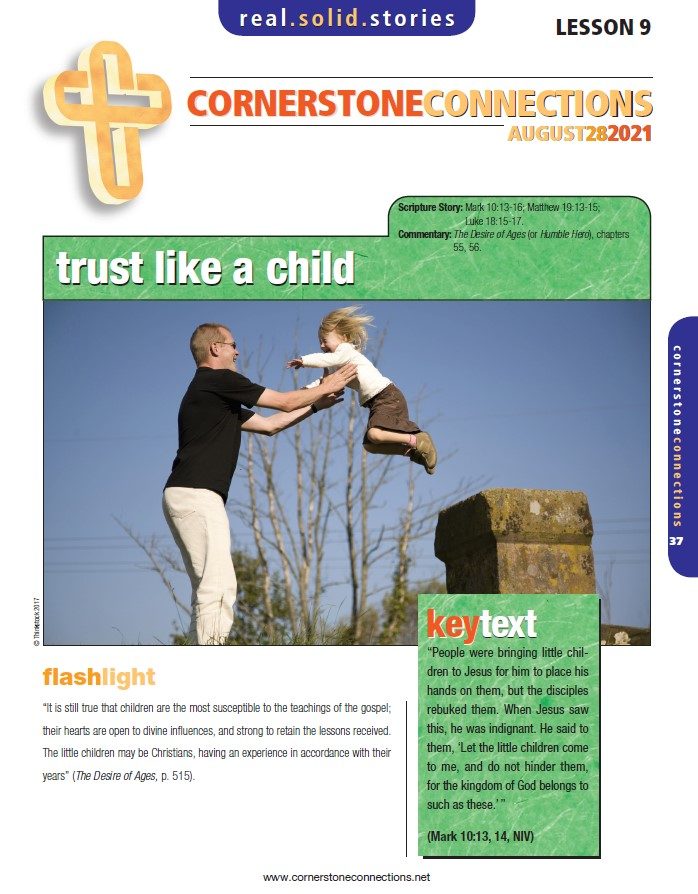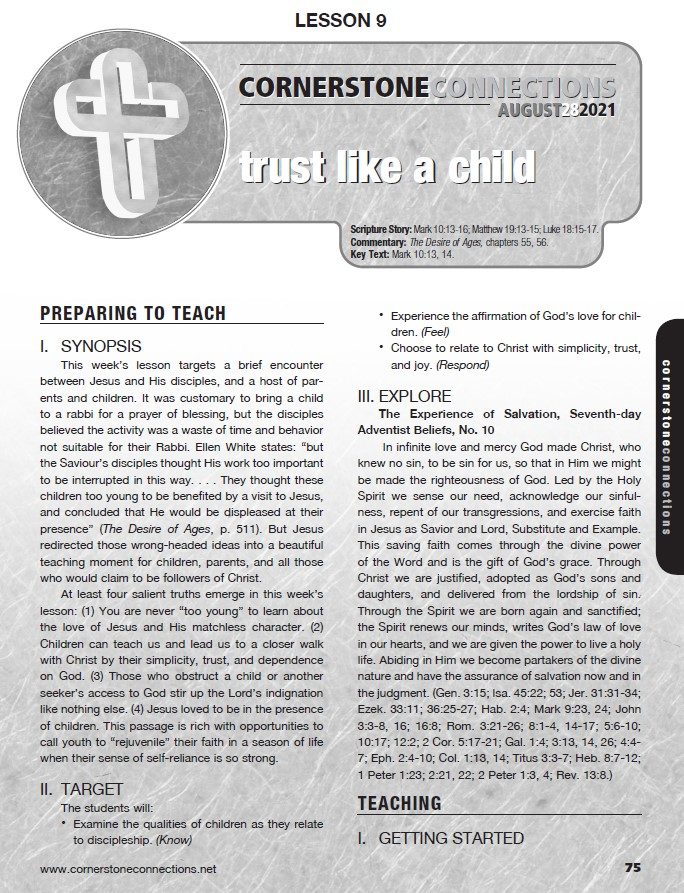Click below to download the Cornerstone Connections leader’s guide and student lesson. This week’s resources also include two lesson plans and a discussion starter video which offer different ways of looking at the topic. Each lesson plan includes opening activities, scripture passages, discussion questions, and real-life applications.
Mark 10:13-16
Matt 19:13-15
Luke 18:15-17
Humble Hero (Desire of Ages)
Chapter 55 - Not With Outward Show

Humble Hero (Desire of Ages)
Chapter 56 - Jesus' Love for Children

When parents brought their children to Jesus for a prayer of blessing, His disciples tried to turn them away. But Jesus loved hanging out with children. Actually, He wants us all to learn lessons about faith from these young disciples.
SCRIPTURE PASSAGES:
OVERVIEW
Have you ever watched a group of little children who are meeting for the first time? It may seem a little awkward at first, but it usually doesn’t take very long before they start to talk and play together. They tend to be more open and have less barriers that get in the way of becoming companionable and sharing toys than their older counterparts. In today’s lesson, youth will discover how Jesus wants His disciples to follow the example of little children by becoming more open, receptive, and willing to change.

OPENING ACTIVITY:
CREATING A MODERN PARABLE
Potential parable settings:
1. You are walking along the road and find a puppy and a stack of $100 bills.
2. You are on a backpacking trip and arrive at your favorite campsite and find that a bear has torn up the tent and eaten all the food of the people who arrived there first.
3. On the first day of school, you notice when the teacher turns around to write something on the board that there is a big rip in the back of their pants.
QUESTIONS
1. What made this process awkward?
2. How much humor did being able to contribute only four words at a time create?
3. What did you learn about how stories are able to share principles of scripture?
4. What parable of Jesus’ is your favorite?
TRANSITION
Children are often the most vulnerable members of society. In our lesson today, Jesus explains that some of the characteristics that are most endearing in children are discouraged in adulthood. These traits that are discouraged in adults are some that are often most needed by older, more calloused adults.

BIBLE STUDY GUIDE
Read Mark 10:13-16.
13 And they were bringing children to him that he might touch them, and the disciples rebuked them. 14 But when Jesus saw it, he was indignant and said to them, “Let the children come to me; do not hinder them, for to such belongs the kingdom of God. 15 Truly, I say to you, whoever does not receive the kingdom of God like a child shall not enter it.” 16 And he took them in his arms and blessed them, laying his hands on them.
QUESTIONS
Read Matthew 18:3-5.
3 “Truly, I say to you, unless you turn and become like children, you will never enter the kingdom of heaven. 4 Whoever humbles himself like this child is the greatest in the kingdom of heaven.
5 “Whoever receives one such child in my name receives me, 6 but whoever causes one of these little ones who believe in me to sin, it would be better for him to have a great millstone fastened around his neck and to be drowned in the depth of the sea.
QUESTIONS
Read 2 Kings 22:1-2.
1Josiah was eight years old when he began to reign, and he reigned thirty-one years in Jerusalem. His mother’s name was Jedidah the daughter of Adaiah of Bozkath. 2 And he did what was right in the eyes of the Lord and walked in all the way of David his father, and he did not turn aside to the right or to the left.
QUESTIONS
Read 2 Kings 23:25.
25 Before him there was no king like him, who turned to the Lord with all his heart and with all his soul and with all his might, according to all the Law of Moses, nor did any like him arise after him.
QUESTIONS

APPLICATION
In today’s lesson we see Jesus placing a great deal of emphasis on the importance of becoming childlike. This viewpoint goes against the idea that people need to grow up to play a significant role in society. How many times have you been told that your opinion isn’t important because you are young or that someday you will understand? Jesus openly told His followers that many of the character traits that the world tries to get children to grow out of are the ones that make them the most open to receiving the message of salvation. Jesus values the receptive, open-minded, pure acceptance that children have toward His message and values. Which group do you think your character fits into best: childlike acceptance or adult skepticism?
FOLLOW UP
Read 1 John 3:1-2.
1See what kind of love the Father has given to us, that we should be called children of God; and so we are. The reason why the world does not know us is that it did not know him. 2 Beloved, we are God’s children now, and what we will be has not yet appeared; but we know that when he appears we shall be like him, because we shall see him as he is.
QUESTIONS

SCRIPTURE PASSAGE
LEADER’S NOTE
For a Relational Bible Study (RBS) you’ll want to get into the Scripture passage and encourage the youth to imagine participating in the story while it’s happening. Then you will be able to better apply it to your own situation today.
You will need to ask God for the Holy Spirit to be present as your small group discusses the questions (no more than 3-6 people in a group is recommended). Start with the opening question. It is a personal question and the answer is unique for each individual. There is no right answer and nobody is an expert here, so don’t be surprised when you hear different responses. You are depending on the Holy Spirit to be present and to speak through your group. Say what God prompts you to say, and listen to what others share.
Take turns reading the chapter out loud. Follow that with giving the students some time to individually mark their responses to the questions (a PDF version of the handout is available as a download). This gives each person a starting point for responding when you start to share as a group. Next, begin the discussion by asking the students to share what they marked and why on each question as you work your way through. Feel free to take more time on some questions than others as discussion warrants.
Encourage each person in the group to apply what is discussed to their personal lives and to share with the group what they believe God wants them to do. Then ask them to pray that God will help each of them to follow through in doing so. Remind them to expect that God will show them ways to live out the message of this passage in the coming week, and that they are free to ask others in the group to help hold them accountable.
Be sure everyone takes time for personal applications before you end your Sabbath School time together.
OVERVIEW
It was natural that Jewish mothers should wish their children to be blessed by a great and distinguished Rabbi. Usually they brought their children to such a person on their first birthday. This was the tradition they had in mind when they brought the children to Jesus.
We will fully understand the almost poignant beauty of this passage only if we remember when it happened. Jesus was on the way to the cross and He knew it. Its cruel shadow can never have been far from His mind. It was at such a time that He specifically took time for the children.
The disciples were not boorish and ungracious men. They simply wanted to protect Jesus. They did not quite know what was going on, but they knew quite clearly that tragedy lay ahead, and they could see the tension under which Jesus labored. They did not want Him to be bothered. They could not conceive that He could want the children about Him at such a time. But Jesus said, “Let the children come to me.”
Incidentally, this tells us a great deal about Jesus. It tells us that He was the kind of person who cared for children and for whom children cared. He could not have been a stern and gloomy and joyless person. There must have been a kindly sunshine around Him. He must have smiled easily and laughed joyously. I deeply embrace the view that one does not fully believe in Christianity if children are never to be found playing around them. Jesus was mindful of the children even with the grim foreboding of the cross of Calvary looming over His soul. What a testament to His love for little children!
“Child, Please . . . !”
Can you share a time when you felt unwanted, or in the way, as a child?
Read Mark 10:13-16.
13 And they were bringing children to him that he might touch them, and the disciples rebuked them. 14 But when Jesus saw it, he was indignant and said to them, “Let the children come to me; do not hinder them, for to such belongs the kingdom of God. 15 Truly, I say to you, whoever does not receive the kingdom of God like a child shall not enter it.” 16 And he took them in his arms and blessed them, laying his hands on them.
1. What was the scene like around Jesus in Mark 10:13-16?
2. Why were the parents in the crowd?
3. What did the disciples do to the parents and kids present?
4. How did Jesus respond to the disciples’ actions?
5. What did Jesus say to the disciples?
6. What did Jesus do for the parents and children in the crowd that day?
7. When are you most humble like children usually are?
8. How can you be more childlike in your spiritual journey?
SUMMARY
Picture the scene with me! Anxious mothers with squirming and squealing babies push for a place in line to feel Jesus’ touch and receive His blessing. The persistence of those who brought the children is implied by Mark’s choice of a verb tense that means they “kept on bringing their small children” to Jesus.
To protect Jesus and His priorities, the disciples take strong and decisive action against the people who bring their young children for a blessing. Teaching and miracles should preoccupy His time and attention, not the touching of children to satisfy a mother’s whims. When the disciples’ attitude unmasks their true values, Jesus flashes instant grievance. Not only does He come to the defense of the children, but He advances them to the top of the scale of values by which a person enters the kingdom of God.
Contrary to the usual interpretation of this passage, the qualities of humility, peace, and joy do not earn the child a first place in the kingdom. Children, in their own way, can be the most arrogant, hostile, and sullen of all creatures. Their identification with the kingdom of God is their lack of power and their need for help. A child in arms has neither social influence nor personal strength upon which to rely. Utter trust relaxes the child in the arms of the parent. So it is with all who enter the kingdom of God.

APPLICATION
A loving Jesus embraces the children. As always, Jesus backs up His words with an act of love. Mark alone gives us unique insight into the depth of Jesus’ feelings when He said, “And He took them up in His arms, laid His hands on them, and blessed them” (v. 16). The words, “took them up,” can be amplified to suggest that Jesus cuddled each child as He blessed them. I can just imagine the deep emotions shared by all present as they embraced Jesus’ advocacy for the children. Think of those kids and how they must have felt being in the arms of Jesus.
Below, find some application activities to interface with this lesson. These are simply to provide ideas for your usage, or to invite you to imagine and create some of your own, as you impact the lives of teens for God’s glory.




